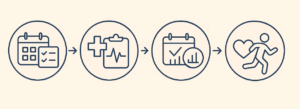Monitoring and Long-Term Management of ADHD Medications
 Starting ADHD medication is only the beginning of the therapeutic journey. The real skill lies in sustaining benefits, minimizing risks, and adapting treatment over time. ADHD is a chronic condition, and long-term medication management requires vigilance, flexibility, and collaboration with patients and families.
Starting ADHD medication is only the beginning of the therapeutic journey. The real skill lies in sustaining benefits, minimizing risks, and adapting treatment over time. ADHD is a chronic condition, and long-term medication management requires vigilance, flexibility, and collaboration with patients and families.
1. The First Few Weeks: Short-Term Monitoring
When a patient begins medication, the first 2–6 weeks are crucial.
-
Symptom tracking: Use structured tools (e.g., ADHD Rating Scale, Conners) alongside parent/teacher feedback.
-
Side effect monitoring: Appetite, sleep, headaches, mood changes.
-
Vitals: Blood pressure and pulse should be checked at baseline, then at follow-ups.
-
Growth in children: Height and weight should be recorded on growth charts.
2. Ongoing Reviews: Every 3–6 Months
Long-term prescribing means consistent follow-up.
-
Effectiveness review: Are core symptoms (inattention, hyperactivity, impulsivity) still controlled?
-
Functional outcomes: Academic performance, workplace productivity, social and emotional functioning.
-
Physical health: Monitor cardiovascular parameters and growth trajectory in children.
-
Mental health: Screen for co-occurring depression, anxiety, substance misuse.
3. Considering “Drug Holidays”
Some clinicians recommend planned breaks (“drug holidays”), particularly for children, to:
-
Assess whether medication is still needed.
-
Reduce effects on growth.
-
Allow families to experience baseline functioning.
Drug holidays must be individualized, not universal. They work best during low-demand periods (e.g., school vacations).
4. Managing Long-Term Risks
-
Growth suppression: Consider dose adjustments or breaks if growth slows significantly.
-
Cardiac safety: Rare but important; ECG or cardiology input if risk factors exist.
-
Tolerance and misuse: Review adherence, check for diversion, prefer long-acting formulations in at-risk groups.
-
Emotional blunting: Some patients report feeling “flat.” A different dose or medication may restore balance.
5. When to Reconsider the Treatment Plan
It may be time to rethink strategy if:
-
Side effects outweigh benefits.
-
Functioning does not improve despite adequate dosing.
-
Co-existing psychiatric or medical conditions complicate management.
-
The patient enters a new life stage (transition to adolescence, adulthood, or older age).
6. The Role of Psychoeducation and Lifestyle
Medication is only part of the plan. Long-term success comes from combining it with:
-
Behavioral therapy
-
Parent training and school collaboration
-
Lifestyle changes: Regular exercise, sleep hygiene, nutrition, and digital discipline
Conclusion
ADHD medications are safe and effective when used thoughtfully, but long-term treatment requires active monitoring, individualized care, and flexibility. With the right approach, children and adults with ADHD not only manage symptoms but thrive across life stages.
✦ About the Author
I’m Dr. Srinivas Rajkumar T, MD (AIIMS, New Delhi), Consultant Psychiatrist in Chennai. At my Mind and Memory Clinic (Apollo Clinic, Velachery, Opp. Phoenix Mall), I specialize in ADHD management, integrating medications, behavioral interventions, and advanced neuromodulation therapies like rTMS, tDCS, neurofeedback, and ketamine therapy.
📍 Mind and Memory Clinic, Apollo Clinic, Velachery, Chennai (Opp. Phoenix Mall)
📞 +91 85951 55808